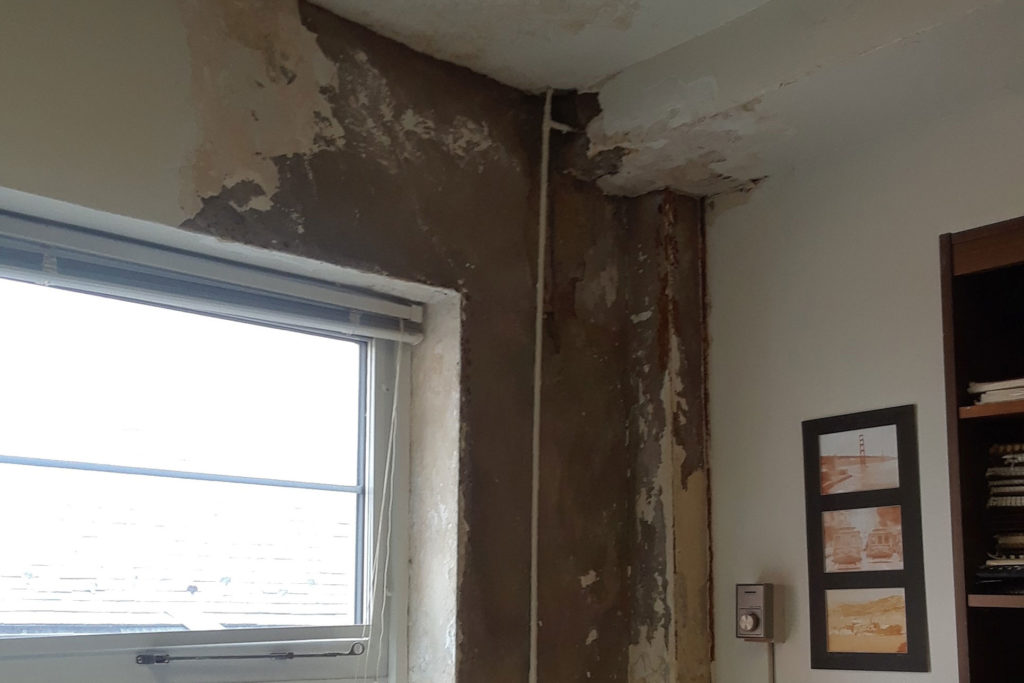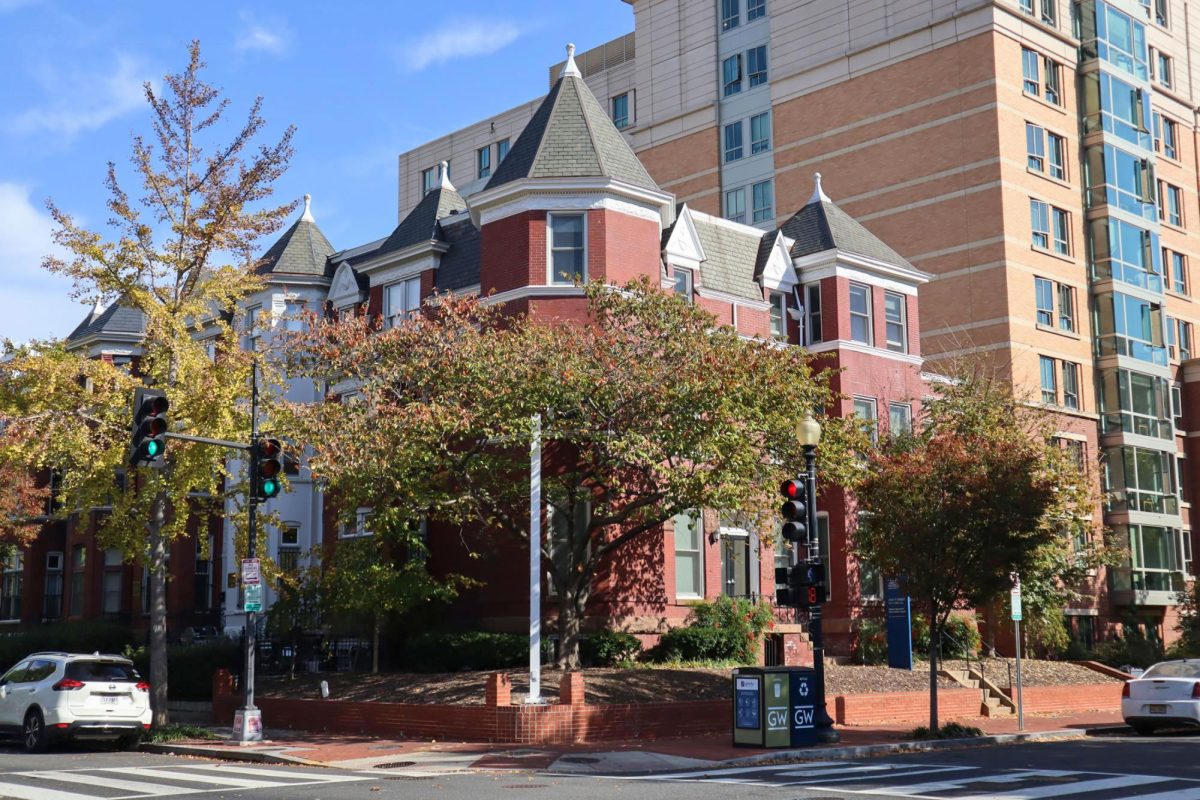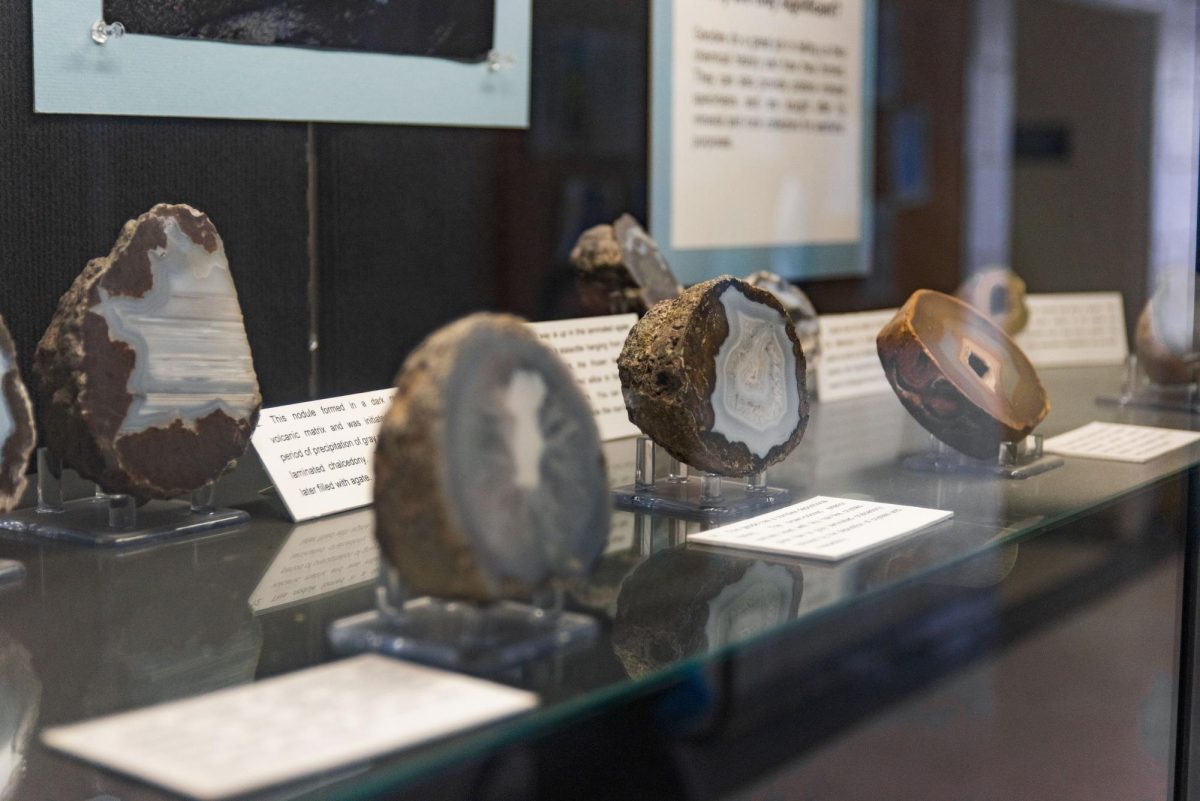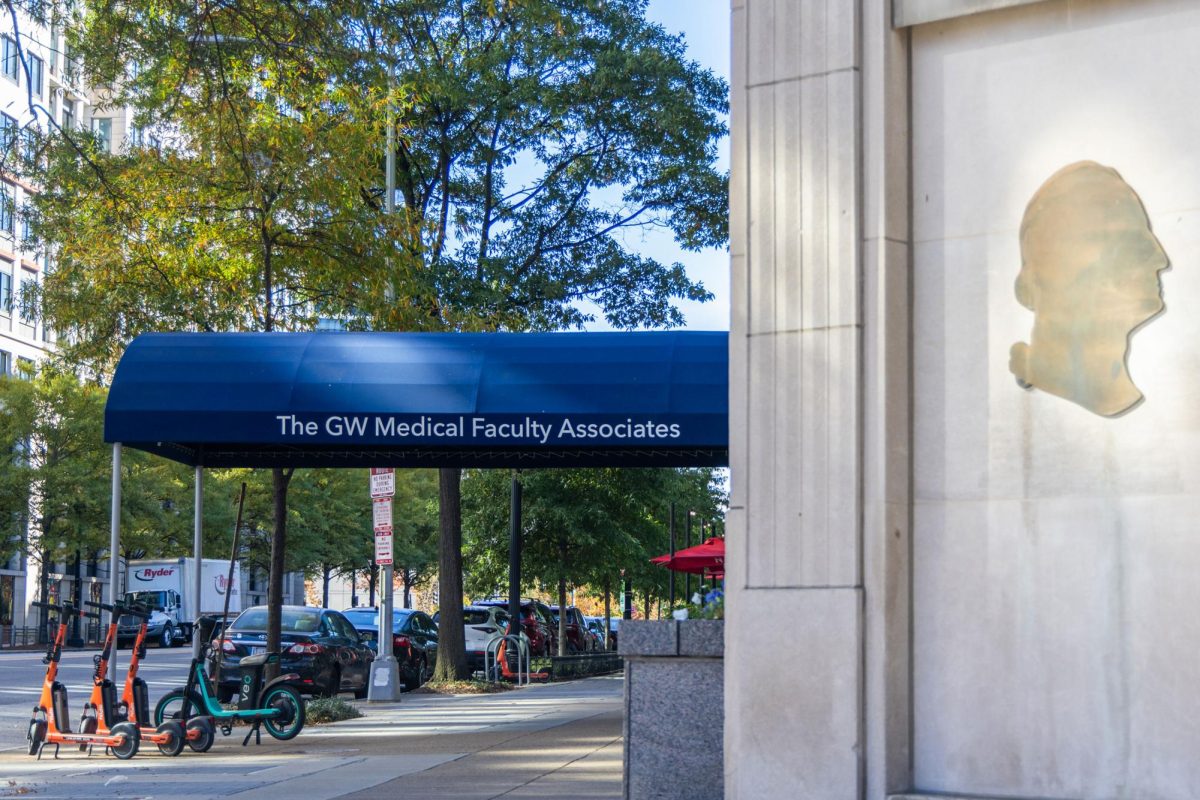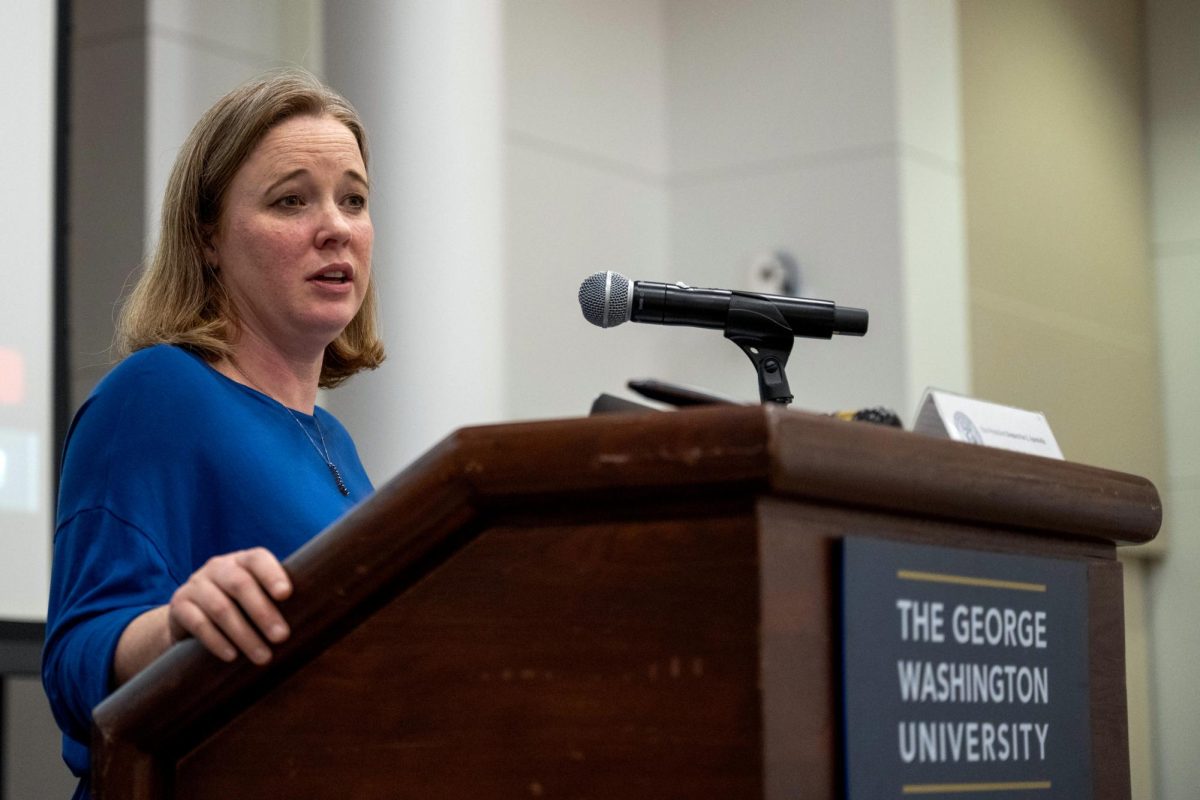Updated: May 13, 2019 at 1:37 p.m.
This month’s sewage overflow in the psychology department building at 2125 G St. is business as usual for Cynthia Rohrbeck, an associate professor of psychology.
Almost 10 years ago, Rohrbeck watched as sewage flowed from the third-floor bathroom about 20 feet down the hall to her office. Stains from that incident are still visible in her office.
This academic year alone, sewage pipe bursts have occurred twice, causing damage to bathrooms, hallways and offices. But the building’s sewage overflow is among several problems the psychology department is currently facing, including mold, a malfunctioning air conditioning system and pests like rats and cockroaches.
Now, after years of hundreds of FixIt requests, more than 10 members of the department are demanding a new building.
“Bottom line – it’s time for us to move,” Rohrbeck said.
More than 15 faculty members and graduate students said “systemic” improvements to the building are needed to address issues like poor ventilation and smell and stains caused by pipe bursts. If the problems are not resolved, officials should relocate the department, they said.
Rohrbeck said Beth Ethier, the operations coordinator for the psychology department, has filed 30 to 50 FixIt requests for the building this academic year for issues that she said may have affected occupants’ health. She said there have been water leaks and mold in the building throughout her time at GW, which has prompted some professors to stop working in the building.
“Some people have been saying, ‘Maybe we shouldn’t come back into the building now until we know it’s safe,’” she said.
Rohrbeck said one member of the department filed an anonymous complaint to the Occupational Safety and Health Administration following the sewage overflow two weeks ago. Last week, Brian Lee, the director of Health and Emergency Management Safety, sent a letter to OSHA explaining that a professional cleaning company removed the sewage and other contractors will begin to replace damaged tiles this week.
She said an anonymous faculty member also filed an OSHA complaint in December related to poor air ventilation, but the agency concluded its investigation after an inspector decided that the temperature in the building’s rooms was satisfactory.
Rohrbeck added that officials originally planned to replace the HVAC systems in the building this summer to improve ventilation and abate extreme temperatures in some of the building’s rooms. At a department meeting last week, John Philbeck, the department’s chair, said administrators told him that the HVAC improvements were no longer budgeted for the summer.
“We’re appalled,” Rohrbeck said. “A couple people said this gave them hope, and they were just astonished that now it isn’t happening.”
University spokeswoman Maralee Csellar said the Division of Operations and Health and Emergency Management Safety staff worked to clean the sewage leak by scrubbing the floor and removing calcium buildup in pipes for days after the building’s occupants notified the University on May 1.
She said staff members will work to remove and replace affected floors and carpets in the next few days. After the work is completed, an outside contractor will test for sewage contamination and check the building’s air quality, she said.
“Our first priority in responding to the OSHA complaint is to ensure that the building continues to be safe and habitable,” Csellar said in an email.
Csellar said officials will provide the results of the air quality and contamination testing and administrators’ plans to fix the sewage issue to OSHA in a letter, which will be posted in the psychology building.
Faculty members have notified the dean’s office in the Columbian College of Arts and Sciences about “other recent issues” like pest control, Csellar said. She said the office is working with the Division of Operations to address the outstanding FixIt requests.
Csellar declined to name the cause of the sewage issue two weeks ago. She also declined to say whether the sewage overflow is a single incident or part of a continued pattern of building maintenance issues.
Ethier, the psychology department’s operations coordinator, said all but one single-stall bathroom in the building is shut down because of the sewage overflow. Ethier said the building’s history of sewage leaks lead her to believe the cause is structural, unlike what maintenance workers told her.
“They tried to tell me today somebody might have put paper towels in the toilet, and I said, ‘If this has been happening various times for years, I really don’t think this is a single miscreant,’” Ethier said. “That doesn’t seem logical.”
She said the last sewage overflow happened in September and the effects of the overflow can still be seen throughout the building: Water stains remain on the second-floor ceiling, and paint on the walls continues to fall off.
“If this building was a human, it would have organ failure,” she said. “It’s beyond the help that they can give it. At the same time, there’s no place to move us, so here we’ll stay.”
Andrew Gepty, a third-year doctoral student, said he has had to apologize to his psychology clients that visit the building because of the lingering smell from the sewage issue.
“That’s really embarrassing, having to apologize for facilities,” he said. “I couldn’t work in my office down here because the smell was so bad.”
Gepty said he has also struggled to fully perform his responsibilities as a teaching assistant because of “coughing fits” caused by mold and “unbearable” variations in temperature in the building’s rooms resulting from the lack of internal temperature controls in the building.
“Since there’s no ventilation or temperature control within the rooms, it’s like we’re at the mercy of having to call facilities every time there’s some discomfort,” he said.
Maria-Cecilia Zea, a professor of psychology, said psychology department faculty have met with prospective students who rejected GW’s offer of admission, citing the building’s maintenance issues as a significant factor in their decision.
“It’s the nature of the building that’s just uninspiring to come to study and spend five years of your life in a building like this one,” she said.
Zea said faculty members feel the building’s current status is reflective of a lack of appreciation for the department having the second-highest number of enrolled students in CCAS and for what the department provides for the University.
“Some of us feel that psychology is the ‘Cinderella of the University’ in that we are the second-biggest major, and our faculty brings in millions of dollars in grants, but we do not get any rewards in terms of space,” she said.
Paul Poppen, a professor of psychology, said the department no longer invites guest speakers to come to the building and hosts them in the Marvin Center instead.
He said officials repaint the building each summer to cover up the leaks throughout the building from the previous academic year. He said this approach to addressing the leaks shows how administrators generally address the problems facing the psychology department – with cosmetic fixes instead of solutions aimed at the root of the problem.
“What needs to be done is very expensive,” he said. “The heating systems need to be dealt with. The electrical outlets need to be dealt with. The plumbing system needs to be dealt with. It’s a whole set of things, and it requires a major re-examination of all those things.”
Hayden Smith contributed reporting.


